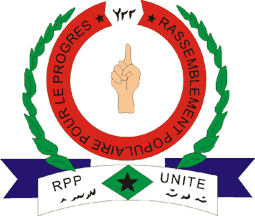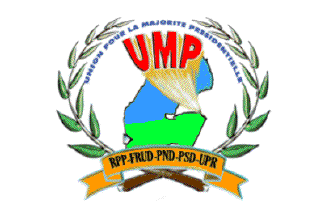 Image by Jaume Ollé, 14 Dec 2008
Image by Jaume Ollé, 14 Dec 2008Source: http://commons.wikimedia.org/wiki/Image:Frud-emblema.png

Last modified: 2022-10-22 by bruce berry
Keywords: djibouti | jibuti | peace | sea | star (red) | afars |
Links: FOTW homepage |
search |
disclaimer and copyright |
write us |
mirrors
See also:
The "Mouvement pour le Renouveau Démocratique et le Développement" (Movement for Democratic Renewal and Development) (MRD) is a supporter of the "Parti du Renouveau Démocratique", the main opposition party in Djibouti, itself a follower of the "Mouvement pour la Paix et la Réconciliation" (Movement for Peace and Reconciliation).
In spite of significant popular success in the legislative elections in 1992
(24% of the votes), 1997 (19%) and 2003 (37%), the PRD was prevented by the
election system from having a seat in the National Assembly. The PRD, together
with the other opposition parties, boycotted the 2008 elections.
Article
1 of the party statutes says:
"[...]
The emblem and the flag of the party
are made of a sailing ship confidently sailing on the water." (http://www.mrd-djibouti.org/Parti/StatutsTitre1.aspx)
On the small image shown on the top of the party website front page, the
ship is gray with "MRD" written in black on the sail, the sky is white and there
seems to be "MRD" written in white on the blue sea.
Ivan Sache, 29
November 2008
On 04 September 1992 a draft of the Constitution was approved by the citizens
of Djibouti. A law appended to the draft but never published, established multipartism, authorizing only four political parties. The MPR (Mouvement pour
la Paix et la Réconciliation / Movement for Peace and Reconciliation) became a
legal political party and changed its name to PRD (Parti du Renouveau
Démocratique / Party of Democratic Revival). The founding congress of PRD was
hold on 12 September 1992 in the house of the late Mohamed Djama Elabé, who was
elected President of the PRD. On 27 September 1992, PRD was the first opposition
party to register officially.
According to Article 1 of the PRD status, "[...] The emblem and the flag of the
party are made of a white dove bearing an olive branch." The status does not
prescribe the colour of the field on which the emblem has to be put.
(Source: Party website).
Ivan Sache, 12 August 2002
 Image by Jaume Ollé, 14 Dec 2008
Image by Jaume Ollé, 14 Dec 2008
Source:
http://commons.wikimedia.org/wiki/Image:Frud-emblema.png
The "Rassemblement Populaire pour le Progrès" (People's Rally for Progress)
(RPP) was founded on 04 March 1979 by the first President of the Republic of
Djibouti,
Hassan Gouled Aptidon, who had been elected president shortly after the proclamation of the
Republic on 27 June 1977. After the re-election of President Gouled with 84% of
the votes on 12 June 1981, the National Assembly proclaimed
the RPP as the sole authorized political party in Djibouti on 24 October 1981.
This status continued
until the reintroduction of multipartism in September 1992. The RPP has been the
dominant party in Djibouti since independence, winning all the presidential
and legislative elections in 2003 and 2008 as the main component of the "Union
pour la Majorité Présidentielle".
Article 1 of the party statutes
status:
"A political party called 'Rassemblement Populaire pour le Progrès
(RPP)' has been created on 04 March 1979 in Dikhil (Republic of Djibouti). The
emblem and flag of the party show on a white background a closed hand with the
forefinger pointing upwards, the whole inscribed in an oval frame made of olive
leaves surrounding the organisation acronym, and in base an horizontal stripe
charged in the middle with a five-pointed green star and the writing, on two
lines, "RPP-Unity", in French and Arabic languages." (http://www.rpp.dj/fr/statuts.htm)
There is a small image of the party emblem on the top of the party website
front page, but no image of the flag seems to be available.
Ivan Sache,
29 Nov 2008
An internal coup occurred in FRUD on 22 February 1994 that resulted in a split into two factions: FRUD-Kifleh Ahmed and FRUD-Dini. The former was a component of the government. From the peace dated 26 December1994 to the legalization of FRUD-Kifleh Ahmed on 06 March 1996, RPP was known as RPP-FRUD and both used the same emblem because the constitution of Djibouti only allows for four political parties and four already existed. Later FRUD (Kifleh Ahmed) gave support in the December 1997 elections to the RPP and together they obtained the full 65 deputies; the coalition also was know as RPP-FRUD. FRUD (Kifleh Ahmed) was member of the government coalition with RPP nominally as a separate movement; while FRUD-Dini remained in the armed struggle and was renamed FRUD-Renaissance on 23 March 1996. The Government coalition was renamed (2003) Union pour la Majorité Presidentielle.
Their flag is yellow with the party emblem in the center.
Jaume Ollé, 14 Dec 2008
 Image by Ivan Sache, 29 Nov 2008
Image by Ivan Sache, 29 Nov 2008
Emblem after the
party poster, available on the party
website.
The "Union pour la Majorité Présidentielle" (Union for the Presidential
Majority) (UMP) was formed before the 2005 presidential election from the merging of the
"Rassemblement Populaire pour le Progrès" (RPP) -
which was
founded in 1979 and was the sole legal political party in Djibouti from 1981 to 1992)
- the "Parti
Populaire Social Démocrate" (People's Social Democratic Party (PPSD) founded in
2002), the "Parti National Démocratique" (National Democratic Party)
(PND),
founded in 1992) and the "Front pour la Restauration de l'Unité et de la
Démocratie" (Front for the Restoration of Unity and Democracy) (FRUD), a former
Afar guerilla group founded in 1991). Ismail Omar Guelleh (b. 1946) was chosen
in 1999 by the ruling RPP as the successor of his uncle, the historic party
leader and first President of Djibouti, Hassan Gouled Aptidon (1916-2006,
President in 1977). Elected President of the Republic the same year, Guelleh was
re-elected in 2005 without a challenger. In 2008, the UMP (including another
component, the "Union des Partisans de la Réforme" (Union of Reform
Partisans) (UPR) founded in 2005 as an offshoot of the FRUD), won all of the 65 seats
at the National Assembly following the boycott of the election by the opposition
parties. In 2003, the UMP had already won all the seats in spite of the
opposition having won 38% of the votes.
The UMP website shows several
photographs of meetings held during the campaign for the general election. The
flag of the UMP appears on several photographs as white with the party emblem,
e.g., http://www.ump.dj/meetings.html,
final meeting in Hassan Gouled Stadium, 06 February 2008.
There is
sometimes writing added below the emblem, for instance VOTEZ (black) UMP (green)
on a flag used during the meeting held in the municipal stadium, 27 January
2008:
http://www.ump.dj/_archives-meeting2701.html.
The emblem of the UMP,
as shown on the front page of the party website, shows a blue and green map of
the country, alluding to the national colours, with the party name acronym in
red letters emerging from a yellow torch, the whole surrounded by two branches
and surmounted by the name of the party in small blue capital letters. Below the
emblem is a yellow scroll charged with the acronyms of the names of the
constituting parties, RPP - FRUD - PND - PSD - UPR. A bigger image of the emblem
(not placed on a flag) can be seen on photographs taken during the meeting at
UNFD, 04 February 2008, confirming the acronym PSD instead of the expected PPSD (http://www.ump.dj/_archives-meeting0402.html).
However, the acronym PSD seems to be used as seen in "La Nation", 29
November 2004,
http://www.ump.dj/_archives-meeting0402.html.
A smaller flag,
seemingly made of a paper sheet attached to a wooden stick, is shown waved by
supporters of the party on some of the photographs. The flag is white with the
red writing VOTEZ / UMP, surmounted by the black writing, in much smaller
letters, ELECTION LEGISLATIVE / 2008, flanked by the party emblem. See for a
complete view of the flag photographs of the meeting held at Cheikh Moussa, 03
February 2008:
http://www.ump.dj/_archives-meeting0302.html.
Finally, a
completely different flag, probably belonging to one of the
components of the UMP, can be seen on photographs taken during the meeting
held at Chaikh Moussa, 03 February 2008:
http://www.ump.dj/_archives-meeting0302.html.
The flag is red
with a white writing on top, and a white star surmounting a white crescent
placed horizontally pointing upwards.
Ivan Sache, 29 November 2008